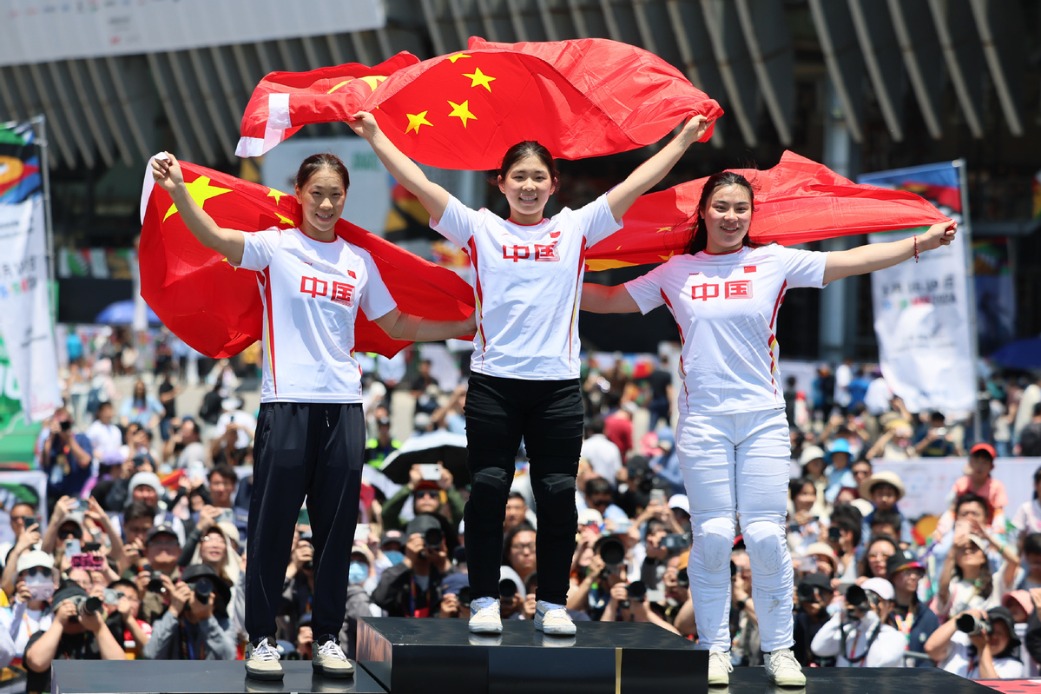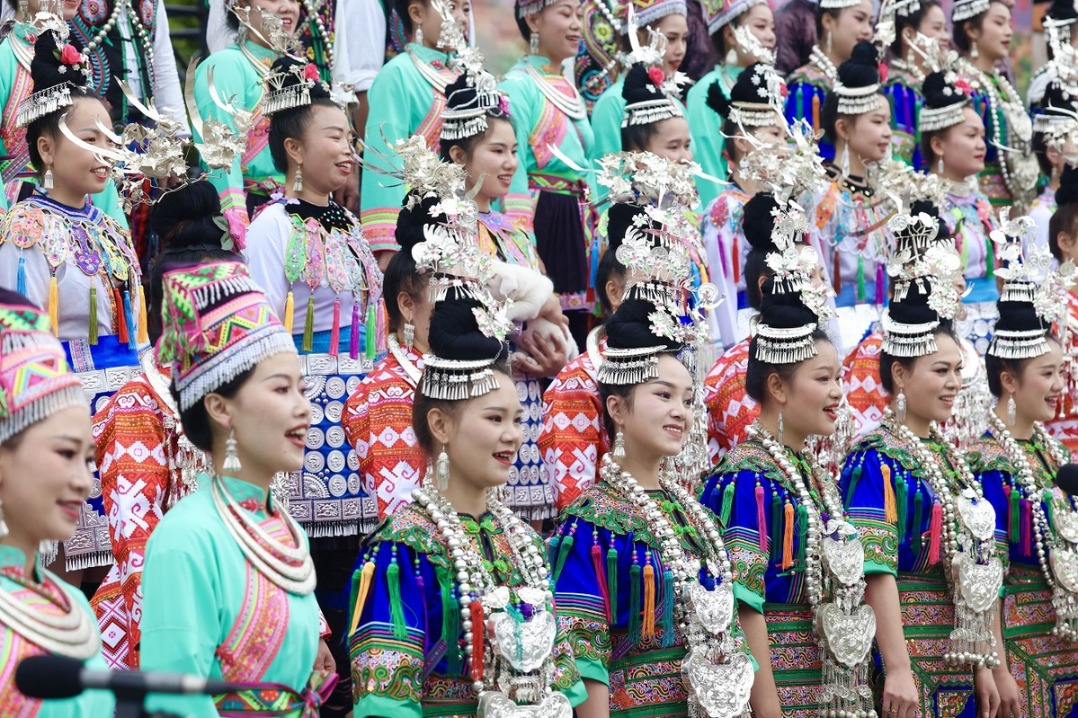China's Legal Framework and Measures for Counterterrorism
The State Council Information Office of the People's Republic of China January 2024
CHINA DAILY | Updated: 2024-01-24 06:55
IV. Protection of Human Rights in Counterterrorism Practices
China respects and protects human rights as an underlying principle in improving its legal framework and practices in the field of counterterrorism. It integrates the punishment of terrorist activities with the protection of human rights. In handling cases involving terrorist offenses and crimes, it gives equal weight to safeguarding the basic rights of citizens, preserving social order, and protecting the rights of victims and interested persons as well as suspects, defendants and convicts.
— Maintaining a safe environment and social order where human rights are guaranteed. Terrorism poses a significant threat to national and public security, and to people's lives and property. Strengthening counterterrorism measures to prevent and punish terrorist activities in strict accordance with the law is essential in safeguarding human rights. The government has succeeded in curbing the spread of terrorism, protecting citizens' rights to life, health and property, and maintaining social stability, while taking firm actions to protect the lawful rights and interests of citizens and organizations, and guard against discrimination based on geographical area, ethnic group, or religion.
Example 8 Greater Sense of Public Security
According to the results of the annual national survey on the sense of public security, the proportion of positive answers rose from 87.55 percent in 2012 to 98.62 percent in 2021, sustaining the high level and receiving widespread public acclaim.
— Protecting the rights of victims and interested persons. In responding to terrorist incidents, China prioritizes the personal safety of those who are subject to direct harm and threat, organizes relief and provides medical treatment for victims, and evacuates and relocates potential victims. Following initial response operations, relevant government departments take measures to help individuals and organizations resume normal life and work, restore social order, and relieve public concern in affected areas. These departments offer timely help, provide psychological and medical assistance to victims and their close relatives as appropriate, and guarantee the basic living needs of victims and their close relatives who have lost basic means of life.
Example 9 Assistance for Victims of Terrorism
Following a terrorist incident in Xinjiang Uygur Autonomous Region, relevant departments provided medical aid and psychological evaluation and intervention for victims and organized rehabilitation activities, including psychological counseling and physical exercises, for those impacted. These endeavors aimed to help the victims recover both physical and mental health.
— Protecting personal freedom and dignity. China's Constitution and laws specify that citizens' personal freedom and dignity shall not be violated.
When taking compulsory measures that restrain personal freedom, such as detention and arrest, agencies handling cases of terrorism strictly follow the criteria, procedures and time limits prescribed by the law. Public security agencies cannot make arrests without prior approval by people's procuratorates or decisions by people's courts. People's procuratorates have strengthened examination of the need for custody, proposed release or alternative compulsory measures when custody is deemed unnecessary, and precisely implemented the statutory criteria in approving any extension of custody for investigation.
Agencies handling cases of terrorism have abided by the provisions of the Constitution and the law that personal dignity shall not be violated. They have ensured that suspects and defendants are provided with necessary food and rest time and are safe from physical abuse and insults. Interrogations that utilize violence, threats or intimidation, obtainment of evidence through torture, threat, enticement, deceit and other illegal means, and forced self-incrimination are all prohibited. Confessions extorted by torture or other illegal means shall be excluded.
Example 10 Lawful and Prudent Use of Criminal Compulsory Measures
Separate investigations were conducted into five suspects from Xinjiang Uygur Autonomous Region for involvement in a terrorist organization. When examining their case for prosecution, local procuratorates, in accordance with the law, approved the arrest of one suspect who was accused of organizing crimes. The four other suspects were found not to have posed actual harm, and their arrests were rejected.
— Safeguarding the right to defense. Suspects and defendants of terrorist crimes are entitled to a defender from the first interrogation or the day of the enforcement of compulsory measures by investigation agencies. Those eligible for legal aid services are entitled to an appointed attorney as their defender. Judicial and judicial administrative agencies pilot programs for full coverage of attorneys' defense throughout the stage of examining criminal cases for prosecution, assign defense attorneys to suspects who have no defenders, and expand the scope of criminal legal aid.
To ensure that suspects' and defendants' right to defense is fully realized, judicial agencies have strengthened attorneys' rights to information, application, and petition during proceedings, and their rights to meet with suspects and defendants, consult case files, collect evidence, and take part in inquiry, cross-examination, debate and defense.
Example 11 Protection of Defendants' Right to Defense
During court sessions for a terrorism case in Xinjiang Uygur Autonomous Region, defense attorneys were assigned, in accordance with the law, to three defendants who were accused of organizing, leading and participating in terrorist organizations and had no defenders, with the aim of guaranteeing their right to defense.
— Ensuring the rights to information and participation. Prior to announcing any decisions surrounding administrative penalties for terrorist activities, administrative agencies have a duty to inform the accused of the specifics of punishment, the facts of violations, and the reasons for and basis of punishment, as well as their rights to statement, defense, and a hearing. The facts, explanations and evidence provided by the accused, once verified, must be admitted by administrative agencies.
During investigations of cases involving terrorist crimes, the family of the suspects and defendants must be notified of the enforcement of compulsory measures. In cases where this may hinder an investigation, notification must be issued immediately after the potential risk has passed.
During criminal proceedings involving terrorist crimes, suspects and defendants must be informed of the charges, the specifics of their case, and their rights to apply for an withdrawal, appear before the court, participate in court investigations and debates, and deliver a final statement.
— Protecting the right to legal relief. China's laws protect right of the accused to comprehensive and multichannel legal relief.
Those who have received administrative penalties for terrorism and who disagree with the decision have the right to apply for administrative reconsideration or to bring an administrative lawsuit and entrust attorneys with the legal proceedings.
Those found guilty of terrorist crimes, their authorized defenders, and close relatives have the right to appeal should they disagree with first instance judgments by local people's courts, and this right shall not be withheld under any pretext. Those convicted have the right to appeal against judgments and rulings that are already legally effective. Should an appeal comply with statutory conditions, people's courts and people's procuratorates must institute trial supervision procedures and remand the case for retrial by the original people's court.
Those whose rights and interests have been damaged through wrongful administrative penalties or criminal penalties have the right to claim state compensation as provided by law.
— Safeguarding the right to court proceedings in ethnic spoken and written languages. China's Constitution and laws grant citizens of all ethnic groups the right to use their own language in court proceedings.
Judicial agencies are required to provide interpreting and translation services in terrorism cases for any party to court proceedings who has little knowledge of the spoken and written languages commonly used in the locality.
In areas where people of one ethnic group live in compact communities or multiple ethnic groups live together, court hearings must be conducted in the spoken language commonly used in the locality, while judgments, notices and other documents shall be issued in the written language commonly used in the locality. In ethnic autonomous areas, people's courts and people's procuratorates shall handle cases in the commonly used local language and be reasonably equipped with personnel proficient in local ethnic spoken and written languages, while legal documents shall be written in the commonly used local language or languages as appropriate.
Example 12 Protection of the Right to Court Proceedings in Ethnic Languages
In a violent terrorism case in Xinjiang Uygur Autonomous Region, the suspects, defendants, and victims and their immediate relatives were from multiple ethnic groups and used multiple ethnic languages. Throughout court proceedings, interpreters and translators were assigned to interpret for parties concerned during court sessions and translate legal documents, thereby guaranteeing the right to proceedings in ethnic spoken and written languages for those involved in the case.
— Ensuring the legitimate rights and interests of convicts. China's laws specify that convicts' personal dignity, personal safety, lawful properties, and the right to defense and appeal, and the right to submit complaints and accusations, along with other rights that have not been deprived or restricted by law, shall not be violated.
Enforcement agencies respect the personal dignity of those convicted of terrorism and defend their legitimate rights and interests. People's procuratorates exercise supervision over the execution of criminal punishments. Convicts who disagree with legally effective verdicts have the right to petition, and enforcement agencies must handle convicts' complaints and accusations without delay or transfer these materials to the relevant agencies, and inform the complainants and accusers of the results.
During incarceration, convicts are entitled to correspondence and meetings with their relatives, attorneys and others. To ensure prisoners receive timely medical treatment, prisons are equipped with medical facilities to provide in-prison treatment, and prisoners are permitted to be transferred outside prison for medical treatment or be released on medical parole if necessary.
Following the principle of combining punishment and reform, with emphasis on the latter, prisons provide cultural, legal and technical education to increase offenders' knowledge, skills and employability, while special efforts are made to prevent offenders of terrorist crimes from reoffending.
In handling cases of commutation and parole, enforcement agencies and people's courts strictly follow statutory procedures and criteria. Enforcement agencies make recommendations to the people's courts, which can grant commutation or parole where eligible. People's procuratorates exercise supervision over these decisions.
























